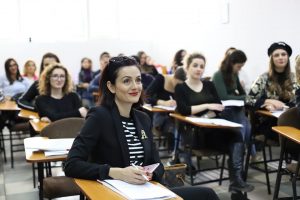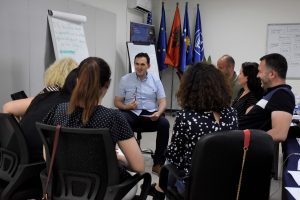UBT College Branch in Prizren was established to meet the needs of the local market and establish a better connection with the local and regional community of Prizren. The UBT College was licensed to operate as a private bearer of higher education by the Ministry of Education, Science and technology no. 808/02-1, date. 18.10.2004. The UBT College Branch Prizren was established in 2016 with the decision on licensing 648/16. The philosophy of the institution has been to offer competitive programs in education that would base teaching on labor market demands and international practices. UBT College Branch – Prizren is demand-driven though it has also offered programs in Architecture, Management, Business and Economy, Integrated Design, Computer Science, Food Science and Technology, and Law where it feels that it can contribute to local and regional economic development of Prizren.
The UBT College Branch in Prizren will apply excellence in teaching, learning and research within an inclusive, student-centered environment to foster graduates who are willing to take on or strengthen their leadership role in business, professions, industry, public service and society in the Prizren region. The institution will promote knowledge creation and knowledge transfer and is committed to the educational development of Prizren society in a way that reflects its regional and national priorities.
Mission statement
“To deliver transformative, inclusive, and professionally anchored higher education, advancing regional prosperity, lifelong learning, and knowledge-based development through excellence in teaching, applied research, and civic partnership.”
This mission centers on five core pillars:
- Transformative Education: Preparing students to lead change in their professions and communities.
- Inclusiveness: Providing access to quality education regardless of background, with a focus on underserved regions.
- Professional Anchoring: Designing curricula and pedagogy in alignment with industry and regulatory frameworks.
- Civic Responsibility: Engaging in projects that foster local development and democratic values.
- Knowledge Economy Integration: Encouraging innovation and entrepreneurship in regional economic sectors.
The mission directly supports UBT’s institutional goals while emphasizing the distinct developmental role of the Prizren Branch within the broader Kosovo higher education system.
Vision statement
“To become a leading regional institution of higher learning, recognized for academic excellence, applied innovation, and sustainable engagement with the cultural, economic, and civic ecosystems of Prizren and its surrounding regions.”
This vision captures the intent to:
- Elevate the academic profile through competitive programs and teaching quality.
- Foster innovation ecosystems via research-industry partnerships and knowledge transfer.
- Build a strong civic identity, anchoring the institution within the local community fabric.
- Advance cross-border educational diplomacy, especially with Albanian-speaking regions and European networks.
The Prizren Branch envisions not only serving as a provider of education, but also as a facilitator of change, catalyst of growth, and platform for collaboration across multiple disciplines and stakeholders.
Documents:
- Strategic Plan UBT Branch Prizren 2025-2030
- Research strategic plan-UBT Prizren Branch
- Comprehensive Branch Institutional Self Evaluation Repoert UBT_Prizren
- Long-Term-Staff-Development-Operational-Plan-UBT-2025-2030_Prizren
- Quality Assurance Manual of College UBT_07.03.2024 with branches incorporated
- Quality Assurance Policy of UBT iwth branches incorporated
- Quality Improvement Plan based on comprehensive internal sself evaluation_Prizren
- THEMATIC ANALYSIS OF PROGRAM COMPLIANCE WITH KOSOVO ACCREDITATION AGENCY STANDARDS BASED ON EXTERNAL EXPERT TEAM EVALUATIONS INCLUDING BRANCHES
- QUALITY IMPROVEMENT PLAN ON THEMATIC ANALYSIS OF PROGRAM COMPLIANCE WITH KOSOVO ACCREDITATION AGENCY STANDARDS BASED ON EXTERNAL EXPERT TEAM EVALUATIONS INCLUDING BRANCHES
- UBT College_Prizren Branch_Strategy Implementation Review_DS-2025
- Research Performance Report UBT Prizren 2025
- Job Vacancy Announcement – Prizren






